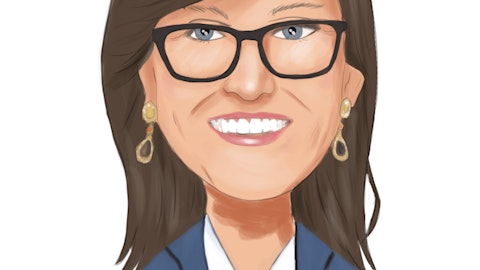Amit Noam: Hi. So, Thrivus’ sales in 2023, again, we’re just in the beginning of entering the market, but we saw this year two main things. One is, we’ve continued the growth compared to last year, but we’ve encountered some production challenges that limited the amount of the product that we were able to produce this year. We fixed it for next year. Next year, we’re supposed to be able to produce a lot more than we did this year to be able to grow the sales. Second thing we’re doing is that we got regulatory approval from Canada. So, next year, we will sell also in Canada, which triples the land area that is addressable for us to sell. Canada is twice the size as the U.S. in our relevant crops. And the second thing that we’re doing is that we’re advancing to additional crops.
We’re currently running field trials in different crops like durum and barley and oats and others. And hopefully, next year, we’ll be able to, in addition to adding another country, add additional crops, and that will enable us to accelerate the sales.
Ben Klieve: Great. Very helpful. Thank you, and congratulations on all the progress year-to-date. Thanks for taking the questions. I’ll get back in queue.
Ofer Haviv: Thank you.
Operator: The next question is from Brett Reiss from Janney Montgomery Scott. Please go ahead.
Brett Reiss: Good morning, gentlemen. Thanks for the opportunity to ask a question or two. First question, I just want to understand the flow of — the cash management on the castor seed part of the business. If you get continued large orders, you have to lay out capital to the entities producing the seeds. And then once the seeds are delivered to the customer, we get paid and reimbursed. What is the timing on all of that?
Ofer Haviv: Okay. Eyal, can you take this question?
Eyal Ronen: Yes. Basically, there are many pathways to conduct those businesses or those deals. We normally take the responsibility to produce the seeds and bring them to the port. And from that port, whether it’s used in Latin America or in Africa, the client is responsible for dispatching and taking the goods on his behalf. In terms of the recognition of the revenue and income, some of it is obviously paid in advance in order to support the production, especially if we talk about substantial production. And later on, once the goods arrive at the port of the client, we are receiving the final — completion of the payment. So that’s in terms of the support of the capital to provide the cultivation of seed — of the castor.
Ofer Haviv: Maybe I will add a little bit more. We have three different sites where we are producing the seed, which is the product that Casterra is selling to its partners. One is — the smallest one is in Israel. Then we have one in Africa, and the other one is in South America. When we collect the purchase order from our partners, then we instruct our subcontractors how much we would like them to grow and produce for us seeds to support the purchase orders. In some cases, yes, we have already some seed in the inventory, but especially when there is such a significant increase in demand like that we have been exposed this year, so of course, we can’t support such a quantity based on existing inventory. So, we ask our subcontractors in all of these locations to start to grow the seeds that we are going to distribute to our partners.
And of course, they are using our genomics, they are using our protocol, and we are networking our subcontractors during the growing season. And after four months, we have the seeds and then our subcontractor doing the harvesting, the dehulling, coating the seeds, packaging them, and then they’re ready to shipped to our partners. And when the seeds are on the way, so then, of course, we — there is a certain portion of the money that we receive when we transfer the goods at the harbor. And the rest, we receive it when the seed arrives to our customers. So, there is a gap between the amount of money that we pay to our subcontractors to produce the seeds, and then we get our rewards with all the margins from our partner after we supply the needs.
So, this is how it [depends] (ph). And the purchase order that we receive, they are — it’s not something that our partners can cancel. So, in a way, it’s like, again, there is a guarantee that we’re going to receive the money based on the supply of the seeds in a certain period of time. So, this is why we feel comfortable to invest in growing the seed. And sometimes, we will support our subcontractors to strengthen the infrastructure in order to support the high-quality seed to our partners. And then, in a way, we have like a guaranteed that we receive the money from our partners when they will receive the seeds.
Brett Reiss: That was helpful. But in the future, we’re all looking and hopeful that seed orders are really going to explode. Do you have enough existing working capital since there’s a lag between the time you get the order and you get paid to support this robust sales growth that we’re all hopeful is going to come?



